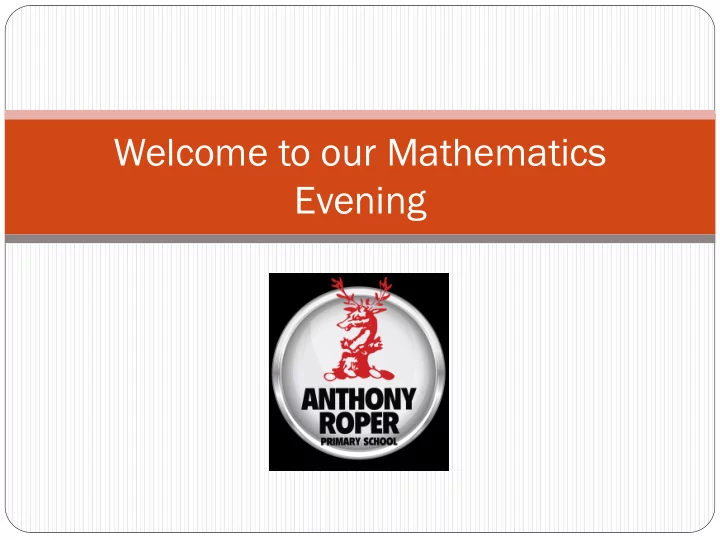

Welcome to our Mathematics Evening
Plan of the evening Explanation of the curriculum. (Full copies on display if you would like a look.) Understanding of fractions. Fun games. Groups looking at how the methods to complete the four operations change.
Fun Maths Interlude!
Questionnaire Thank you for filling in my questionnaire! Data Areas of Mathematics where there are Number of children that enjoy struggles Mathematics 60 50 40 30 Yes 20 Sometimes Adult 10 No 0 Child
Maths Curriculum Children should: Become fluent in the fundamentals of mathematics, including through varied and frequent practice with increasingly complex problems over time, so that pupils develop the ability to recall and apply knowledge rapidly and accurately. Reason mathematically by following a line of enquiry, conjecturing relationships and generalisations and developing an argument, justification or proof using mathematical language. Solve problems by applying their mathematics to a variety of problems with increasing sophistication, including breaking down problems into a series of simpler steps and persevering in seeking solutions.
EYFS and KS1 Confidence Fluency Key Points Place Value Number bonds
Fluency in EYFS and KS1 Game Totality https://nrich.maths.org /1216/note?nomenu=1 Fluent with number bonds and addition. At a higher level, learners can begin to think strategically by considering several moves in advance.
LKS2 Have a way of solving the 4 operations Place value Solve problems Key Points Times tables Equivalent fraction Roman numerals
LKS2 Game – Times Tables Game Bubble multiples Two dice – multiply together. Play against each other. 100 club challenges
UKS2 Extend understanding Using large numbers Making connections between 4 operations, fractions/decimals/percentages and ratio Key Points Factors and multiples Mathematical order (use of brackets) 4 + 3 x (6 + 1) How can you add eight 8's to get the number 1,000?
Fractions/Decimals/Percentages
Fractions/Decimals/Percentages Year 1: Understand ½ and ¼ Year 2: Find ½, ¼, ¾ of objects Year 3: Equivalent fractions, add and subtract simple fractions, sequence simple fractions Year 4: Understand 1/10s and 1/100s inc. with decimals, decimal equivalents of ½, ¼, 3/4, round and compare decimals Year 5: add and subtract fractions with related denominators, convert improper fractions to mixed numbers, order 3d.p. numbers, use % Year 6: Simplify and order any group of fractions, multiply and divide fractions, know equivalences between fractions, decimals and percentages.
Fractions/Decimals/Percentages Game and resources https://nrich.maths.org/1249 http://www.mathplayground.com/Decention/Decention.h tml Explanation of all the fraction, decimal and percentage knowledge that is needed for primary school in a hand out form!
Anthony Roper’s Policy Don’t rush through the topics! Don’t move on just as a topic is understood. We teach we don’t tutor! Manipulatives
Our Addition Policy How methods of addition change as we go through the school Reception, Year 1 and 2 8 + 5 = 13 +1 +1 +1 +1 +1 0 1 2 3 4 5 6 7 8 9 10 11 12 13 14 15 37 + 15 = 52 +10 +3 +2 37 47 50 52
Our Addition Policy How methods of addition change as we go through the school Years 3 and 4 38 + 86 = 124 +30 +4 +4 86 116 120 124 80 + 5 or 80 5 60 + 7 60 7 + 140 + 12 152 100 50 2 152 10 moving on to... 67 267 + 24 + 85 1 1 ( 7 + 4) 12 ( 7 + 5) 80 (60 + 20) 140 (60 + 80) 91 200 352
Our Addition Policy How methods of addition change as we go through the school Years 5 and 6 587 3587 + 475 + 675 1062 4262 1 1 1 1 1 12.45 + 4.70 17.15 1
Groups Where ever your child currently is, go to that phase. In 25 mins we will meet again and then you can go to the next phase to see how it progresses. We are running 2 sessions. Any questions, please ask. (There is nothing to be scared of!)
Recommend
More recommend